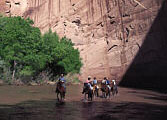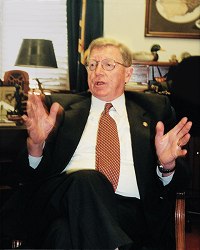
Press Release |
 |
|
How one senator sees the Clinton plan October 10, 2000 U.S. Sen. Conrad Burns isn't a motorcyclist. This Republican
lawmaker from Montana was involved in livestock trading and
agricultural reporting before going to Washington to represent his
state. Yet when they sat down with him in his Capitol Hill office, Managing Editor Bill Wood and Legal Affairs Editor Bill Kresnak discovered that we speak the same language. Burns is painfully aware of President Clinton's plan to shut down access to huge areas of national forest land, since some 6 million acres of that land is in his home state. He may not be a motorcyclist, but Burns is concerned that this plan would cut off a lot of the people he represents from that public land. And, like us, Burns is outraged about the change the U.S. Forest Service is making in its mission statement. That's especially true because the Forest Service's existing "multiple-use" mission was mandated by Congress. Yet so far, the Forest Service hasn't consulted Congress about the changes it's planning. But there's one important difference between Sen. Burns and us. While we can only hope that the Forest Service will listen to our concerns, he could be in a position to get the agency's attention. As a member of the Energy and Natural Resources Committee, Burns is one of the senators charged with overseeing Forest Service operation. More importantly, he has a seat on the powerful Appropriations Committee, which sets funding levels for all government agencies. While we continue our own efforts to defeat Wilderness Lite, here's a look at the way this controversial plan is going over in Washington.
American Motorcyclist: Motorcyclists are obviously very concerned about the possible effects of President Clinton's plan for the national forests. But we realize we're not the only ones who would be affected. There are a lot of people involved in recreation of all types who could be hurt. Have you ever seen a proposal this far-reaching when it comes to the management of public lands? Sen. Conrad Burns: No. Especially when it was just thrown out there with no boundaries, no idea of where it's going to be. It was very, very vague, and it's clear that the general American will not know the boundaries, or the impact of the initiative. So we're pretty concerned about that. I think any time that you start redesignating land use with the stroke of a pen—without congressional approval and without strong, strong support in the area that is being impacted—it is destined to fail. Even the land managers who have to manage the land under that designation have a very, very hard time doing it. As a rule, both the land and the wildlife deteriorate. But if you go through Congress, nine times out of 10 you've got pretty good local support for the designation of the area. People take pride in the fact that they've had a part in the decision-making. AM: As you noted, one of the problems is that this proposal has been so vague. Although it was proposed last fall, (until the draft plan was released just before presstime), we haven't even had maps showing what land we're talking about or exactly what restrictions would be imposed. It sounds like you're saying that you're not getting any clearer information than we are. Burns: That's right. AM: Up until now, if land is going to be designated Wilderness, it goes through Congress. There's a study process, a public debate, a public vote, and then a Wilderness area is designated. Do you see a reason why that system isn't working, why it can't work at this stage? Burns: (Getting public land designated as Wilderness) is not something that can't be done. It just takes a tremendous amount of time and patience to get it done. If you want an efficient government, a monarchy is the way to go. This government is not efficient, nor is it proficient. It just isn't. It's a messy thing when you start talking about Wilderness, but that's how you get local support. Really, this isn't an environmental issue, it's a land-use issue. It's a question of what you want that land to do. If they said it's for scenery or for spiritual value or whatever, so be it. But to say this is an environmental thing—it has nothing to do with the environment. Let's call it what it is, rather than beating around the bush and trying to hoodwink the American people. AM: Some of this land has never been considered suitable for Wilderness, and some of it has been studied and specifically found not to meet the standards of Wilderness. So essentially, doesn't this involve applying Wilderness-like restrictions to land that everyone has agreed should not be designated Wilderness? Burns: That's exactly right. Once it's designated under the Roadless Lands initiative, then it could eventually be managed as Wilderness. AM: So we're essentially going to expand the definition of what is eligible to be designated Wilderness? Burns: Oh no, they can't do that. The law won't allow that. But this administration has never given a great deal of credence to the law. What do they care? This gives them a warm and fuzzy feeling: "Look what we've done.'' AM: There's another issue here involving the Forest Service's mission. Since 1960, Congress has mandated that the Forest Service should be guided by the principle of "multiple-use management to meet the diverse needs of the people." Earlier this year, the agency released a 55-page draft strategic plan that doesn't even mention "multiple-use." Burns: We're very much aware of that and we're very worried about it. I would say that their priorities are completely different than they were in the '60s and '70s. And I would say that some of that is because of the wishes of the American people. People who don't have any public land in their state think public land in other states is theirs. And maybe they don't want anybody there, don't want anyone cutting trees or grazing cattle. AM: But if that's the case, shouldn't those decisions go through Congress, since Congress created this mandate in the first place? Burns: That's exactly right. AM: So what happens if the Forest Service decides to rewrite its mission? Burns: I think it will be contested, first of all. Then I think the (Senate) Appropriations Committee probably will have to look at that. AM: For our members and other Americans who are concerned about this issue, what would you suggest they do? Burns: We've got to turn out for (the Forest Service's public) meetings in numbers. We've got to say, "You're not going to take our land away from us.'' We've got to just drop everything and do it. The problem is the majority of people you represent and the people I represent work all day, and the last thing we want to do is go to a meeting every night. But I think it's time that most of us budget some time for activism. |
Action
Center | Legislative
Update | Federal Regulatory
Update | In the News |
Regional Access
Issues
Who We Are |
Statement of
Purpose | Frequently Asked
Questions | Update
Your Profile | Contact
Us
